Each character entry below contains a ≤1 MB QuickTime movie of the character being painted with a brush, created by Prof. Saeko Komori of Chubu University. Please see the JP Net Kanji Project for more details.
In the following definitions, on (Chinese-based) readings are represented by katakana, and by capital romaji letters; kun (native Japanese-based) readings are represented by hiragana, and by lower-case romaji letters. This is a common dictionary convention, and does not have any bearing on meaning.
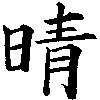
Video: Writing and pronunciation
Printed form: 晴
Readings: は (れる) ha
Meaning: clear up
Mnemonic:
The sun 日 in the blue 青 sky.
Usage Examples:
晴れる (はれる) clear up
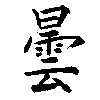
Video: Writing and pronunciation
Printed form: 曇
Readings: くも (る) kumo
Meaning: get cloudy
Mnemonic:
The sun 日 is hiding above clouds 雲.
Usage Examples:
曇る (くもる) get cloudy
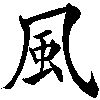
Video: Writing and pronunciation
Printed form: 風
Readings: かぜ/フウ kaze/FUU
Meaning: wind
Mnemonic:
A kite with a picture of a strong 強 warrior on it, flying high in the wind.
Usage Examples:
強い風 (つよいかぜ) strong wind
台風 (たいふう) typhoon
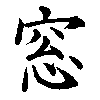
Video: Writing and pronunciation
Printed form: 窓
Readings: まど mado
Meaning: window
Mnemonic:
The combination of the roof radical 宀, public 公, and heart 心.
Usage Examples:
窓 (まど) window
窓口 (まどぐち) ticket window
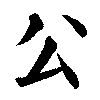
Video: Writing and pronunciation
Printed form: 公
Readings: コウ KOO
Meaning: public
Mnemonic:
An elderly official has drooping eyes 八 and big nose ム.
Usage Examples:
公む員 (こうむいん) government employee
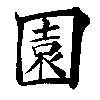
Video: Writing and pronunciation
Printed form: 園
Readings: エン EN
Meaning: garden
Mnemonic:
An enclosed garden far away 遠.
Usage Examples:
公園 (こうえん) park
上野公園 (うえのこうえん) Ueno Park
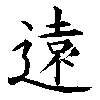
Video: Writing and pronunciation
Printed form: 遠
Readings: とお(い) too
Meaning: far
Mnemonic:
One travels 旅 far on the land 土 with a sack 口.
Usage Examples:
遠い (とおい) far

Video: Writing and pronunciation
Printed form: 雪
Readings: ゆき yuki
Meaning: snow
Mnemonic:
Rain 雨 changes into snow when the temperature drops, and it's time to rake it ヨ.
Usage Examples:
雪 (ゆき) snow
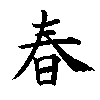
Video: Writing and pronunciation
Printed form: 春
Readings: はる haru
Meaning: spring
Mnemonic:
The sun gives its warmth to the earth and seeds begin to push up their shoots.
Usage Examples:
春 (はる) spring
春休み (はるやすみ) spring vacation
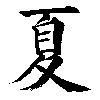
Video: Writing and pronunciation
Printed form: 夏
Readings: なつ natsu
Meaning: summer
Mnemonic:
A big head 頁 with a huge decorated mask dancing with bare feet.
Usage Examples:
夏 (なつ) summer
夏休み (なつやすみ) summer vacation
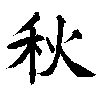
Video: Writing and pronunciation
Printed form: 秋
Readings: あき aki
Meaning: autumn
Mnemonic:
A stalk of grain 禾 and fire 火.
Usage Examples:
秋 (あき) autumn
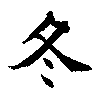
Video: Writing and pronunciation
Printed form: 冬
Readings: ふゆ fuyu
Meaning: winter
Mnemonic:
A picture of a mountain covered with snow.
Usage Examples:
冬 (ふゆ) winter
冬休み (ふゆやすみ) winter vacation
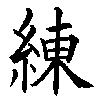
Video: Writing and pronunciation
Printed form: 練
Readings: レン REN
Meaning: to knead
Mnemonic:
The combination of the thread radical 糸 and the east 東.
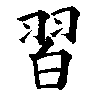
Video: Writing and pronunciation
Printed form: 習
Readings: シュウ SHUU
Meaning: practice; learn
Mnemonic:
White 白 bird's feather 羽.
Usage Examples:
練習 (れんしゅう) practice
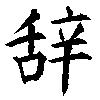
Video: Writing and pronunciation
Printed form: 辞
Readings: ジ JI
Meaning: word; term
Mnemonic:
A critic of bitter 辛 tongue 舌.
Usage Examples:
辞書 (じしょ) dictionary
和英辞てん (わえいじてん) Japanese-English dictionary
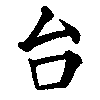
Video: Writing and pronunciation
Printed form: 台
Readings: タイ/ダイ TAI/DAI
Meaning: machine(s); board
Mnemonic:
Katakana ム and ロ.
Usage Examples:
一台 (いちだい) one vehicle
台風 (たいふう) typhoon
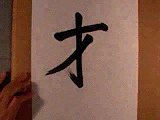
Video: Writing and pronunciation
Printed form: 才
Readings: サイ sai
Meaning: classifier for counting years of human age
Usage Examples:
五才 (ごさい) five years old
二十才 (はたち) twenty years old
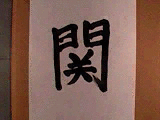
Video: Writing and pronunciation
Printed form: 関
Readings: カン KAN
Meaning: barrier; bolt
Usage Examples:
関係会社 (かんけいがいしゃ) associated/affiliated company
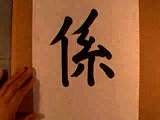
Video: Writing and pronunciation
Printed form: 係
Readings: ケイ/ かかり KEI / kakari
Meaning: connection; involve; concern; affect
Usage Examples:
係の人 (かかりのひと) a person in charge
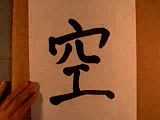
Video: Writing and pronunciation
Printed form: 空
Readings: クウ/ そら KUU / sora
Meaning: empty; sky; open/be opened
Usage Examples:
空の色 (そらのいろ) color of the sky
席が空いている (せきがあいている) seat is empty
空席 (くうせき) empty seat
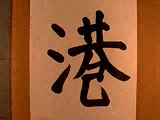
Video: Writing and pronunciation
Printed form: 港
Readings: コウ/みなと KOO / minato
Meaning: port; harbor
Usage Examples:
成田空港 (なりたくうこう) Narita Airport
港が見える公園 (みなとがみえるこうえん) park overlooking a harbor
New Readings
| KANJI | READINGS |
|---|---|
| 近づく | (ちかづく), to approach |
| 大水 | (おおみず), flood |
| 全く | (まったく), entirely |
| 雨が降る | (あめがふる), it rains |
[Quizzes (JavaScript required): Meaning (27 questions) | Reading (17 questions)]
